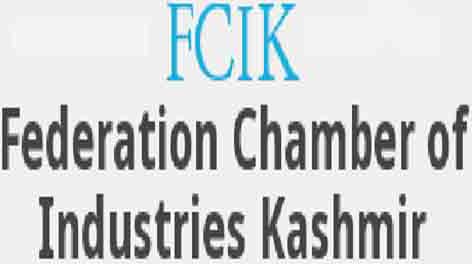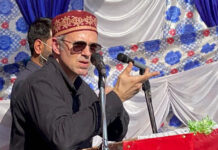SRINAGAR
A three-day National Workshop on Wildlife Photography with the theme ‘A step towards wildlife conservation’ concluded a Dachigam National Park on Monday.
 In a statement DIPR spokesman said that the first of its kind workshop on wildlife photography was organized by Department of Information and Public Relations, (DIPR) in collaboration with Worldwide Fund for Nature (WWF-India) and was supported by J&K Department of Wildlife, Valley Skill and Craft Development Institute Kashmir and Gulshan Books.
In a statement DIPR spokesman said that the first of its kind workshop on wildlife photography was organized by Department of Information and Public Relations, (DIPR) in collaboration with Worldwide Fund for Nature (WWF-India) and was supported by J&K Department of Wildlife, Valley Skill and Craft Development Institute Kashmir and Gulshan Books.
Director, Department of Information and Public Relations, Muneer-Ul-Islam lauded the role of his team and team from WWF-India for being proactive in organising the programme. He said the Department would continue its endeavours to organise more such programmes, workshops seminars and field interactions. He said that the Department is in a process to organise some more interesting programmes for the journalist fraternity of the State. He said that organising Wildlife photography workshop is a step towards wildlife conservation.
He appreciated participants for showing up their keen interest in the Departmental activities, saying that the DIPR had got a massive response to the programme.
On the second day of National Wildlife Photography Workshop, various speakers spoke on the aesthetics of capturing and documenting wildlife.
Former Director of the Bombay Natural History Society, Dr Asad Rafi Rahmani while sharing his experiences said that such workshops were need of the hour at a time when the world is witnessing so much of destruction in wildlife and nature. Dr Rehmani, who has spent more than 35 years crusading for the conservation of nature and is well known the world over for his field research including Bustard Conservation Programme, Bird Community Studies of the Western Ghats, and Forest Owlet Project, lauded the role of DIPR and WWF-India for organising the workshop.
He said that capturing the wilderness in your eyes is one thing and capturing the minute details of the woods in your camera lenses is a different ball of the game. “Generally people indulge in wildlife photography because they want to peruse it either as their hobby, passion or profession. However, not many people know that their hobby, passion or profession can help a lot in the conservation of wildlife,” he said.
Speaking to the participants, noted award-winning wildlife photographer, Dhritiman Mukherjee said that organising such kind of events in order to educate youngsters about wildlife conservation was a welcome step and the organisers must be appreciated for that. He also spoke about his work in relation to the world wildlife.
“Such programmes inculcate a sense of belonging to your own nature,” he said. “In my whole career, this is a first kind of workshop at a place like Kashmir which is so close to my heart,” he said, adding “I have been coming to this place from last over one decade and covering its wildlife, flora and fauna. This workshop is a dimension to my experience.”
Mukherjee’s works are regularly published in National and International print and digital media including BBC, National Geographic, New York Times, Lonely Planet, WWF, London Geographic, Telegraph, and The Guardian.
Earlier, Intisar Sohail from Department of Wildlife delivered a lecture on wildlife scenario Jammu and Kashmir; he informed the participant’s about the number of Bird as well as Animal species of the state. He urged participants to take an active part in wildlife conservation as many Animal and Bird species are on the verge of extinction as some bird species have already disappeared. He also presented a PP Presentation to share his photographs, research and contribution towards the wildlife conservation.
Cinematographer and Producer, EMMRC, University of Kashmir, Shafqat Habib also delivered a lecture on Do’s and Dont’s of wildlife filmmaking and shared his work and experience of wildlife filming. He also screened documentary films to inform audience how important is wildlife conservation to maintain an ecological balance and how humans exploit animals for their vested interests. The documentary highlights various issues and threats faced by the wildlife creatures across the country.
After screening the films he also interacted with the participants and answers the questions raised by them.
Dr Rouf Hamza Boda, a naturalist, also presented his paper and shared his experience and contribution toward the wildlife conservation and impact of modern and changing trends of society on wildlife. He highlighted causes of the spread of disease like Rabies due to the absence of Vultures in food chains. He also urged the need for taking positive and innovative measures towards wildlife conservation to avoid extinction of more animals and bird species.
A short film ‘The Great Outdoors’ was also screened based on a life of a wildlife photographer to motivate participants to take wildlife photography as a profession rather than a hobby and contribute towards wildlife conservation.
Noted Landscape Photographer, Mukhtar Ahmad took one technical session with the participants.
Young filmmaker, Visalat Dada screened and analysed Bert Haanstra’s documentary film ‘Zoo’ a relational comparison of expression to understand the behaviour of humans and caged animals.
The film’s highlights need for rehabilitating animals without out tuning their habitat and making the laughing stock or element of entertainment after caging them in zoos. Dada while interacting with the participants discussed various aspects of filming wildlife.
The workshop was formally inaugurated by minister for Forest, Environment and Ecology, Chaudhary Lal Singh, who was the chief guest on the occasion. On the occasion, the photographs by various wildlife photographers were put on display and the various books written on Kashmir were also available for sale.
Dr Pankaj Chandan from WWF-India educated the participants about the passion and patience for wildlife photography.















